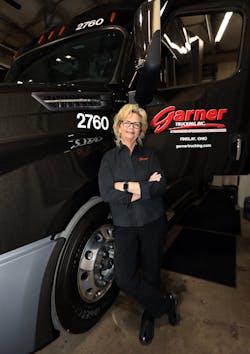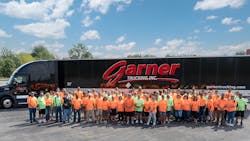America's roadways have become more dangerous in recent years, so it's more important than ever for fleets to reassess their safety operations. The safest fleets not only install the latest safety technology and ensure their drivers operate with caution but that every tier of the company carries the message that it's not just important to get freight to its destination but to get its drivers home.
Fleets seeking to improve CSA scores and reduce collisions can turn to the winners of the Truckload Carrier Associations’ Fleet Safety Awards. Carriers of all sizes can win, from Division I (fewer than 5 million miles) to Division VI (100 million or more miles), and all have common attributes that fleet managers can learn from when it comes to building and enforcing a safety culture.
Safety culture starts from the top
Brumbaugh was adamant that safety begins in the earliest stage of operations—the hiring of employees. She said the carrier places a premium on interviewing employees—face-to-face or by video call—through a process that outlines all the expectations of the job to ensure only the most interested, qualified applicants are attracted, not simply anyone looking for a job. Candidates are required to take a written test to see if they understand safety topics such as hours of service and pre- and post-trip inspections.
Brumbaugh acknowledged that the extra vetting of drivers could make hiring more difficult when the driver shortage already makes finding workers a challenge. However, she argues that the safety benefits outweigh the time expended on the front end. Garner Trucking also has a high retention rate of 70% in an industry where turnover rates hover around 90%, which she said justified the process.
To keep safety at the top of drivers’ minds, Leonard’s risk control department sends weekly safety messages to all employees. The messages include not only weekly data like the number of preventable and non-preventable accidents, passed and failed DOT inspections, and HOS violations but also positive reinforcement via a driver shout-out, where a specific driver is selected based on a clean record. Changes in regulation, weather information, and checklists and video links with safety information are also shared.
“Safety messages are a simple way to ensure good driving behavior is on the minds of the drivers. Feedback from the drivers,” Griffin said, “has been positive. The drivers want to know specifically is going on in the day-to-day operations of the company as it is related to safety.”
See also: What steps are you taking to ensure fleet safety?
Don't just install technology, know it
Brumbaugh said it’s essential for management and trainers to know safety technology inside and out, and one way the carrier maintains this knowledge is by sticking to a single OEM.
“It’s really important to know that I am 100% Freightliner trucks,” Brumbaugh said. "That’s strategic. I can focus on the safety technology that product can offer, and then know it and make sure I can train my drivers for it.”
Garner Trucking also exclusively uses engines from Detroit Diesel but invests additionally to install the company’s Detroit Assurance ADAS technology, paying now to avoid the cost of collisions.
Both Leonard’s Express and Garner Trucking use Omnitracs in their fleets. Garner Trucking uses Omnitracs’ SmartDrive two-way dashcam, to which Brumbaugh attributes much of the carrier’s improved safety over the past two years, in addition to hiring and onboarding practices.
Leonard’s uses Omnitracs’ telematics system to track critical events, such as speeding or hard braking, in real-time, allowing for immediate back-office review and response. This data, as well as data collected by inward/outward facing Samsara cameras that Leonard’s installed due to their artificial intelligence capabilities, is fed into drivers’ scorecards. Those scorecards are used to identify weaknesses in drivers’ habits. Additional coaching often involves practice with a driving simulator from Virage Simulation.
Incentivize safe driving
Leonard’s safety incentives offer drivers up to five figures of extra pay annually. After two years of safe driving, operators receive a $500 Visa gift card, and every following year, the driver will receive $1,000 of additional pay, with each successive year adding another $1,000. This continues up to a cap of $10,000, which qualifying drivers will receive every safe driving year.
Garner also offers additional pay as a safety incentive, up to two cents per mile, and last year its safest driver received a $7,000 bonus. Garner also incentivizes drivers' health by allowing nonsmokers to pay a smaller portion of the cost-sharing for health benefits. Drivers who wish to quit smoking can enroll in a program to do so, which requires drug testing for nicotine. Garner also has an annual biometric screening to complement drivers' DOT physicals.
See also: It’s time to reinforce inspection basics
Mentor rookie driversGarner Trucking has a mentor program where each new driver is assigned a more experienced driver to contact if they have questions, which Brumbaugh said truckers often use when they travel to a new area that veteran drivers have knowledge of.
Garner Trucking also lays out what a driver would need to take on the road—a list of items that a seasoned trucker might take for granted, that a rookie driver might be unaware they need. This includes not only equipment such as a safety vest but food, a shaving kit, and other self-care items. The goal is to help drivers stay well-rested and alert on the road.
"Safety is everyone’s responsibility, Griffin said, "not only the drivers on the road. Expect safety to be part of conversations from all departments when speaking with drivers."
Both carriers emphasized that the most important asset to protect is drivers.
“The cargo’s important, but most important is your safety. We want to get you home to your family,” Brumbaugh told FleetOwner.
“Monitor driver behavior on the roads and respond accordingly," Griffin said. "Always let them know that you are there for them."
About the Author
Scott Keith
Scott Keith is a former fleet owner digital editor, who was on staff from 2022 to 2023.





